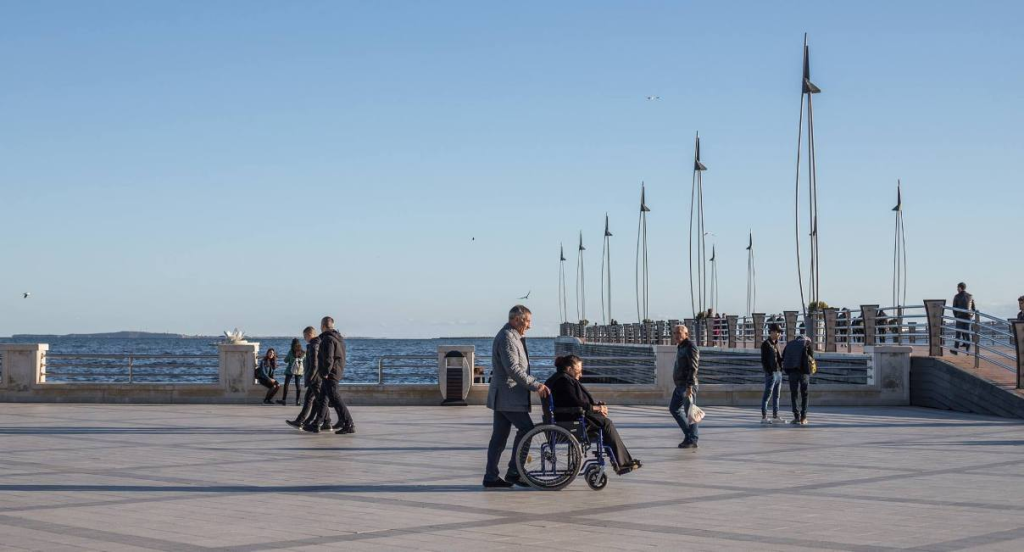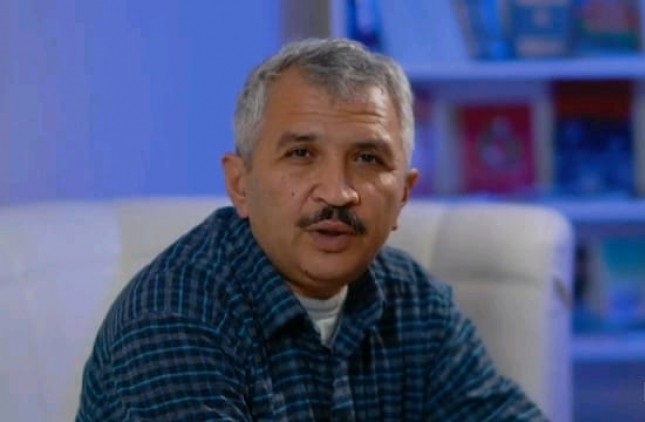Azerbaijan sees significant drop in disability pensioners: What's behind the change?
Disability pensioners in Azerbaijan
“I could barely walk, and speaking was difficult. I couldn’t leave the house without someone else’s help. My husband and I spent months undergoing examinations, and after gathering a mountain of documents, I finally managed to obtain just a third-degree disability status. Even though I am completely unable to work and there’s no chance of recovery. Is this fair?“
Lamiya Nurmammadova, a 44-year-old former nurse, worked at Sumgayit City Clinic No. 4 for 16 years. After undergoing surgery, she completely lost ability to work.
- “Looking for a nanny”: Women in Armenia strive to return to work after maternity leave
- Birth rates decline year by year in Azerbaijan
- «Distant grey island» — a report from Pirallahi, Azerbaijan
Number of disability pensioners in Azerbaijan declines by 2,300 in six months
The number of disability pensioners in Azerbaijan continues to decrease each year, according to data from the State Statistical Committee. In January 2019, there were 390,100 recipients of disability pensions. By January 2024, this number had fallen to 258,700. As of July this year, the figure dropped further to 256,400, meaning that 2,300 individuals lost their disability status in just six months.
The largest decline in disability pension recipients over the past five years occurred in 2021 when pension payments were halted for 23,000 individuals.
At that time, the Ministry of Labor and Social Protection announced investigations that revealed over 7,000 people had obtained “fake disability certificates.” Among those who reapplied for disability status, approximately 16,000 either had their conditions rehabilitated or were found to have ailments not recognized as valid for pension eligibility.

“I spent a year and a half going through bureaucracy to obtain my disability status”
“I suddenly felt pain in my neck and sat down on the floor. Then I became dizzy and lost consciousness. What happened next is a blur to me.
First aid was administered immediately, and then I was taken to the hospital for an MRI. After that, I was brought home. The next morning, I underwent surgery to remove part of my cerebellum (the central organ that regulates balance).
Initially, my husband had to help me shower and use the bathroom. Even now, I struggle to maintain my balance when I walk, and I frequently experience seizures. I had to rely on my 75-year-old mother-in-law for all the household chores.
“For the first three months, I thought I would recover. But the doctor said that the consequences were already irreversible. That’s when I decided to apply for disability benefits,” says Lamia Nurmamedova.
She spent a year and a half gathering the necessary documents and undergoing numerous examinations. Since Lamia couldn’t move on her own, her husband would go to the hospital at seven in the morning on examination days, wait in line for her, and when her turn was approaching, he would return home by taxi to pick her up.
“The examining doctor needs to document my medical information and send it to the Medical-Social Expert Commission so that I can obtain disability benefits. But each time, we received a rejection. Once, they couldn’t find the code for my illness and failed to record it correctly. Another time, they didn’t include the form indicating how functional my arm is. I can barely move, barely speak, and these hospital visits completely exhausted me,” Lamia complains.
“After a year and a half of suffering, I was given a third-degree disability”
Realizing that the hospital in Sumgait wouldn’t help her, Lamia had to go to the Medical-Social Expert Commission for a detailed examination and then to one of the private clinics. Following all the procedures, she was assigned a third-degree disability.
“They determined my pension to be 150 manats (about $80), and they barely provide that. What am I supposed to do with just 150 manats? When I worked as a nurse, I earned over 500 manats (about $290). If my health allowed, I would still be working. A relative of mine is missing a finger, and he was given a third-degree disability. Does that mean we have the same health condition? My brain doesn’t control my body; I can’t even leave the house alone, let alone work,” Lamia laments.
She is preparing to apply for a reassessment of her disability, believing that her health condition warrants at least a second-degree disability.
“It used to be easier to obtain disability benefits”

Ahmad Rahmanov, a member of the board of the public organization “Disabled and Veterans of Karabakh,” is a social worker focused on protecting the rights of disabled individuals and is himself a second-degree disabled person. According to him, the procedures for obtaining disability benefits have become much more complicated than in previous years. He notes that this is one of the main reasons for the decrease in the number of disability pensioners:
“Previously, a specific fact was used as the basis for assigning a degree of disability. For instance, if Ahmad was missing a leg up to the ankle, that was enough to qualify for disability benefits. It was straightforward. Now, in such cases, when visiting a doctor, additional examinations are required. So, instead of granting disability based on a specific fact, they now consider complications arising from that fact. This is why the process in Azerbaijan has become very difficult.”
Ahmad Rahmanov believes that another reason complicating the process of obtaining a disability degree is the inability of the minor officials involved to effectively utilize their authority.
“They’ve structured the system in such a way that, for example, a doctor who needs to provide a conclusion for a patient cannot do so based solely on their own judgment. They must obtain approval from their superior, who in turn needs approval from another, and so on. Those sitting higher up are usually not doctors. For them, reporting is more important than human lives. This is why people are left confused.
There are also claims that the number of people receiving disability pensions has decreased due to the exposure of those who obtained fake disability documents. But I assure you, the number of such cases is not as high as is assumed. The figures are exaggerated,” explains Ahmad Rahmanov.
Ministry of Labor: “The disability assessment process has become easier”
According to the Ministry of Labor and Social Protection, the procedure for obtaining disability benefits is not as complicated as it is often portrayed; in fact, it is simpler and more transparent than before.
“Disability assessments are now conducted electronically, without any interaction between the citizen and the expert. Form 88 (referral), completed by the medical institution where the citizen is registered, is included in the ‘Registry of Referrals for Medical and Social Expertise’ as an electronic document and sent to the ‘Disability’ subsystem of the Centralized Electronic Information System of the Ministry of Labor and Social Protection. Based on the medical data provided in this referral, an initiative decision regarding the citizen’s disability is made.
According to the ‘Disability Establishment Rules,’ citizens who are dissatisfied with the decision of the Medical and Social Expertise Commission (MSEC) regarding their disability are subject to a visual examination at the State Medical and Social Expertise and Rehabilitation Department. Mechanisms have been established within the agency to ensure the accessibility of services for citizens, and an electronic queue system has been implemented for the convenient visual examination of citizens who are unhappy with the decision made. Based on the results of the examination, a decision will be made to uphold, amend, or revoke the MSEC’s decision,” the agency’s press service informed JAMnews.
Alternative interpretation of the statistics
The State Social Protection Fund confirms that there is a decline in the number of disability pensioners, but attributes this to the expiration of disability periods.
“Some of the decrease in the number of pensioners is related to individuals whose disability periods have ended and who did not apply for extensions. Additionally, during the reassessment of disabilities, it was found that several individuals had been rehabilitated and therefore exited the pension system,” the fund stated to JAMnews.
“Obtaining disability benefits is inaccessible for people with physical limitations”
Ahmad Rahmanov notes that one of the situations complicating the process of obtaining a disability degree arises when a person is physically unable to move independently and does not have a caregiver. According to him, in such cases, obtaining a disability designation is practically impossible.
“Recently, a disabled individual was brought to the Rehabilitation Center for a visual examination. This man has been bedridden for almost a year, yet they insisted he attend the visual assessment.
Often, the examination and conclusion from a doctor are insufficient to secure a disability status. People are required to undergo various procedures. In addition to the physical challenges, this creates financial difficulties as individuals are forced to spend their meager pensions on taxis to travel to clinics for documentation.
Regarding the question of whether a medical commission can conduct a home examination for a person with disabilities, citizens can request this, but it is doubtful whether the medical commission will actually come to their home. From my experience, I have yet to meet a person who has successfully arranged this,” the expert explains.
The Association for the Management of Medical Territorial Divisions of Azerbaijan (TƏBİB) rejects these claims. The organization states that individuals who are bedridden can contact a medical institution in their area of registration and submit a request for a home examination.
“In such cases, the medical consulting commission of the medical institution can schedule a visit according to their work schedule and what is convenient for the citizen.”
As reported by JAMnews from TƏBİB’s press service, after assessing all medical documents on-site, if the severity of the individual’s health condition meets the criteria for disability, they can be granted disability status.




















